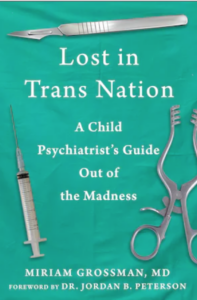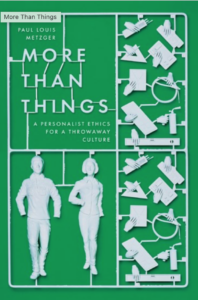
D. Joy Riley, M.D., M.A.
Executive Director
 Philosophy Professor Timothy F. Murphy and medical student Kelsey Mumford recently published in the AMA Journal of Ethics a paper on the possibility of subsidizing uterine transplantation — for transwomen (biological males) and transmen (biological females).
Philosophy Professor Timothy F. Murphy and medical student Kelsey Mumford recently published in the AMA Journal of Ethics a paper on the possibility of subsidizing uterine transplantation — for transwomen (biological males) and transmen (biological females).
The authors posit that government subsidy for expensive uterine transplants could apply to a number of persons identifying as
- Transwomen “who want to gestate their own children”
- Transwomen who don’t want to gestate children but want a uterus “to consolidate their identities”
- Transmen “who want to gestate their own children”
- Males (“cisgender men”) who want to “gestate children of their own”
The authors raise the question of fairness of subsidies for only (biological) women recipients of transplanted uteri. After all, some infertility procedures are covered by insurers in some states. For some people, a uterine transplant (UTx) is a matter of well-being. Murphy and Mumford claim that for transwomen, their lack of uteri “closes off the prospect of gestating a child in a way that is available to women as a class. It follows that lack of a uterus is an obstacle to full participation in the social goods attached to women’s identity.” The paper is replete with ideas about who should have a subsidized uterine transplant and why. The authors conclude that “Even if there are limits on subsidies, the case could be made that no moral obstacle stands in the way of justifying subsidies for UTx for some transwomen and transmen, just as there seems to be no fully persuasive argument against gestating a child via UTx.”
There are multiple problems with this peer-reviewed paper, only a few of which will be addressed here.
- As of June 1, 2023, there had been “around 100 uterine transplants performed worldwide and about 50 healthy babies have been born as a result.” This hardly constitutes standard of care. Yet, it is time to whistle for the gravy train of subsidies to arrive for most (if not all) of those desirous of transplanted uteri.
- The concept of healthcare projected by Murphy and Mumford is one of a provider of services model, where, in the words of Leon Kass, “the physician approaches the status of a functionary, who serves, not the human flourishing of the patient, but the patient’s raw desires.” (quoted in Tollefsen, Christopher, and Farr A Curlin. “Solidarity, Trust, and Christian Faith in the Doctor–Patient Relationship.” Christian bioethics: Non-Ecumenical Studies in Medical Morality 27, no. 1 (2021): 14–29. https://doi.org/10.1093/cb/cbaa022.)
- Because something is technologically possible does not mean it is reasonable or necessary to do.
- “Respect for patient autonomy” should not negate the responsibility of Hippocratic physicians to “do not harm.”
Subsidizing desire is not a function of civilized government.
Worth Your Time: Selections from the Bioethics Library

C. Ben Mitchell, Ph.D.
Distinguished Fellow
The Tennessee Center for Bioethics & Culture
Miriam Grossman, Jordan B. Peterson, Lost in Trans Nation: A Child Psychiatrist’s Guide Out of the Madness
Grossman is angry about the way children and parents are being abused by both segments of the health care community and cultural activists who teach children that they were born in a wrong body or that their gender is “assigned” rather than recognized as consistent with their biological sex. She traces the origins of this abuse to The American Academy of Pediatrics, the American Psychological Association, and the American Academy of Child and Adolescent Psychiatry who, she argues, all drank the Kool‐Aid of John Money, who coined the term “gender identity.” This book is an eye-opener by a seasoned clinician-counselor.
A helpful interview with Dr. Grossman may be found by clicking here.
Paul Louis Metzger, More Than Things: A Personalist Ethics for a Throwaway Culture
Metzger is professor of Christian theology and culture at Multnomah University and Seminary. In contrast to other ethical theories, personalism sees persons (Divine and human) as primary in the moral equation. The volume begins by setting the compass in search of missing persons in a culture enamored with things. It navigates the personalist map from the beginning to the end of life and from neighbors to space exploration. It’s an important book and will be discussed a lot among Christians and others.
A very nice interview by bookseller Byron Borger may be found here: ‘More Than Things’ Webinar with Paul Metzger and Byron Borger on Vimeo
Karen Swallow Prior, The Evangelical Imagination: How Stories, Images, and Metaphors Created a Culture in Crisis
This long-awaited volume by acclaimed author, Karen Prior, argues that what many contemporary Christians take to be Christianity is really Christianity in its Victorian form and not necessarily its biblical form. But it’s not an “ain’t it bad and don’t we all know it” book. Prior makes helpful recommendations for a way ahead that is more faithful to Jesus than to the shrinking imagination of the evangelical sub-culture.
Cherie Harder’s Trinity Forum video conversation with Prior may be found here: Online Conversation | The Shaping of the Evangelical Imagination | The Trinity Forum (ttf.org)





